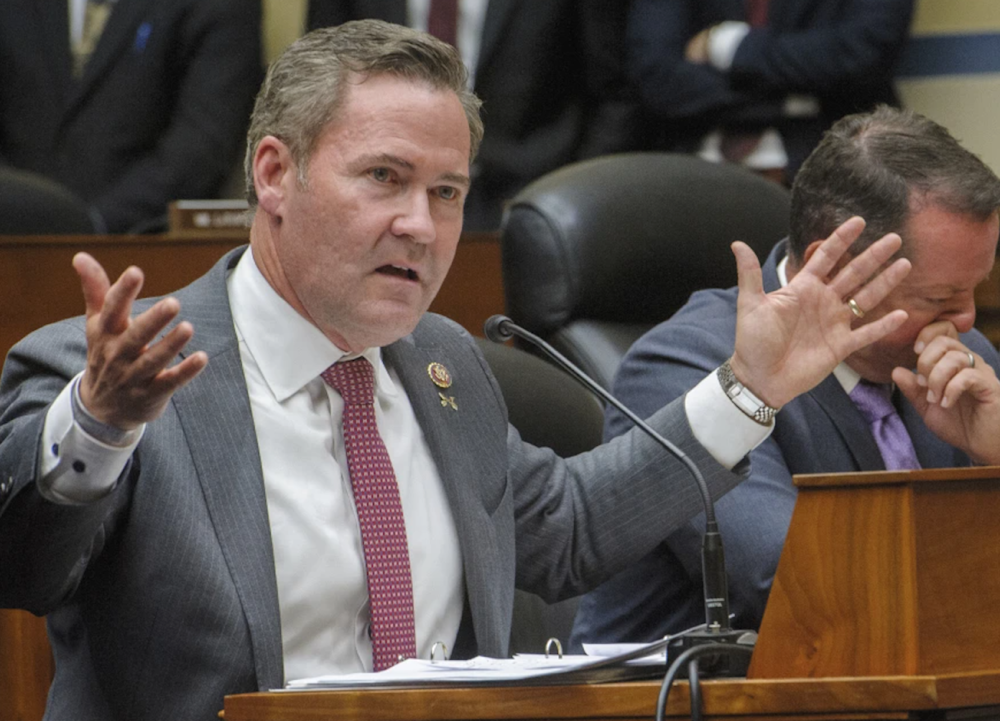Trump fires Waltz, replaces him with Rubio in purge amid Signal fiasco
The US National Security Advisor was dismissed amid fallout from a Signal chat leak, growing internal dissatisfaction, and increasing ideological divergence from President Trump.
-

Representative Mike Waltz speaks during a hearing on Capitol Hill on July 22, 2024, in Washington. (AP)
US President Donald Trump ousted his national security advisor, Mike Waltz, on Thursday and named Secretary of State Marco Rubio as his interim replacement in the first major shakeup of Trump's inner circle since he took office in January.
Waltz and his deputy, Alex Wong, were fired on Thursday, with more removals expected to be announced soon.
Trump's appointment of Rubio to temporarily replace Waltz will be the first time, since Henry Kissinger in the 1970s, that one individual has served as both secretary of state and national security advisor.
After sacking National Security Advisor Mike Waltz for a purported leak concerning a Signal discussion, US President Donald Trump has nominated him as the next US Ambassador to the UN.
In a Truth Social post, Trump hailed Waltz's record "on the battlefield, in Congress, and, as my National Security Advisor," adding, "I know he will do the same in his new role."
Meanwhile, Trump announced, “Secretary of State Marco Rubio will serve as National Security Advisor, while continuing his strong leadership at the State Department," adding, “Together, we will continue to fight tirelessly to Make America, and the World, SAFE AGAIN.”
Waltz, a former Florida congressman and decorated Green Beret, has faced criticism—especially from Democrats—since March, when The Atlantic editor-in-chief Jeffrey Goldberg revealed he had been added to a Signal chat where senior officials, including Waltz, Defense Secretary Pete Hegseth, and CIA Director John Ratcliffe, were discussing strikes on the Yemeni Armed Forces (YAF).
Disillusioning leadership style
Meanwhile, The Wall Street Journal reported that White House Chief of Staff Susie Wiles and other top officials had grown disillusioned with Waltz's leadership style and personnel choices, arguing that the aides he brought in failed to resonate with Trump’s MAGA base.
Meanwhile, Wong, previously a key figure in Trump’s DPRK diplomacy, had faced unsubstantiated accusations of being pro-China from outside Trump allies. Waltz's chief deputy national security advisor was identified in the Signal conversation leak earlier this year as the staffer responsible for "pulling together a tiger team" in Waltz's initial message sent to the Signal group chat in March, The Atlantic reported at the time.
Waltz told Fox's Laura Ingraham that he took "full responsibility" for making the group, calling his blunder "embarrassing".
'First, not last'
When questioned about claims that Waltz and others might be fired, White House Press Secretary Karoline Leavitt told Fox News Digital earlier Monday, "We are not going to respond to reporting from anonymous sources."
Following Waltz's dismissal, House Minority Leader Hakeem Jeffries said on Fox News, "The National Security Advisor Waltz is out. He's the first. He certainly won’t be the last."
Earlier, the Trump administration insisted that no classified information was shared in the March Signal chat and stood by National Security Advisor Mike Waltz, with officials declaring the matter “closed” despite the accidental inclusion of a journalist in the discussion.
Waning influence, search for successor underway
Waltz, who had already been sidelined from major policy debates, including Iran nuclear talks and Russia-Ukraine diplomacy, was recently told by President Trump not to attend a Michigan rally.
Once praised for his ability to communicate conservative national security stances on television, Waltz was seen as increasingly ineffective in articulating Trump’s agenda.
Moreover, he frequently diverged from the president's positions, taking more traditional, hawkish stances on issues like Ukraine and Iran, which placed him at odds with Trump’s more isolationist tendencies. His ideological misalignment and interpersonal clashes with other White House figures further eroded confidence in his role.
Trump had four national security advisors during his first term, and Waltz’s successor will be the sixth across both presidencies. Waltz had previously survived internal shakeups, including one in April when Laura Loomer persuaded Trump that some of his hires were undermining the agenda, resulting in the firing of several staffers and signaling Waltz’s waning influence.

 4 Min Read
4 Min Read








